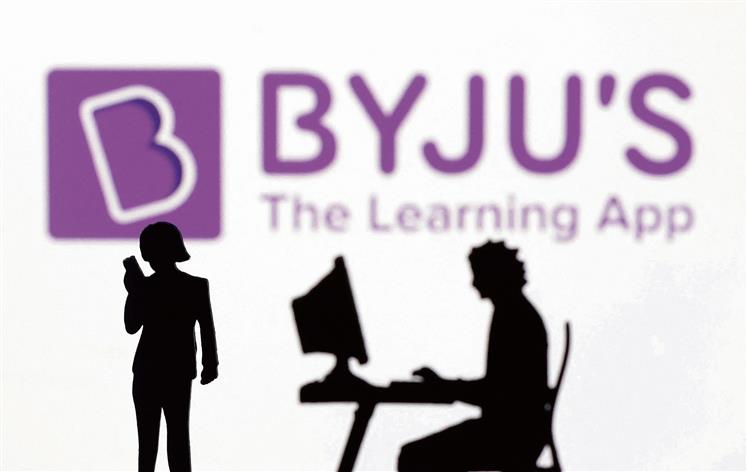
Animesh Singh
Till some time back, tutor-turned-entrepreneur Byju Raveendran was the poster boy of India’s startup universe. The valuation of his educational technology (edtech) company Byju’s touched $22 billion in 2022. Today, it is less than $2 billion. The downfall, say market experts, offers a terse lesson for India’s corporate sector. The Byju’s saga, they add, indicates corporate misgovernance, apart from issues such as overvaluation and costly acquisitions. It also underscores the absence of a mechanism to ensure corporate intelligence.
Byju Raveendran started his edtech company in 2011, offering services ranging from online tutorials to offline coaching. It attracted billions of dollars from global investors when online education services were in high demand during the Covid-19 pandemic. Reputed venture capital entities like Sequoia Capital, Prosus and BlackRock as well as Qatar Investment Authority backed his company.

Thereafter, Byju’s rapidly acquired several edtech firms which specialised in different fields. A hugely successful offline company like Aakash, along with Great Learning and Epic, was taken over by a Byju’s company, Think and Learn.
During the pandemic, the firm sponsored the Indian cricket team and even hired football superstar Lionel Messi as its brand ambassador. The focus on brand building apparently overshadowed the core business fundamentals.
After the initial euphoria, when Byju’s tablets sold for record numbers for online studies during the Covid-19 restrictions, the sales fell in 2022 once life normalised and people started going to work and children to school. This, coupled with overambitious investments, led to trouble for the edtech company.
Allegations of financial mismanagement surfaced as the company not only ran into losses, but also faced disputes over the non-payment of dues to a host of companies. Investors alleged opacity, which led to the exit of auditing firm Deloitte. The situation reached a flashpoint in January this year with shareholders, led by the Netherlands-based Prosus, convening an Extraordinary General Meeting seeking to remove the company’s founder and CEO, Byju Raveendran. They are now seeking complete withdrawal of the family from the firm, even as the founder is fighting a rearguard battle to stay on as CEO.
Meanwhile, complaints of mismanagement have prompted hearings by the National Company Law Tribunal (NCLT), while the Ministry of Corporate Affairs has launched its own investigation into the company’s affairs.
A few days back, Byju Raveendran had a public slanging match with shareholders seeking his ouster. The ministry has also decided to fast-track the inspection report. The Enforcement Directorate, in the meantime, has renewed its lookout notice against the founder.

According to Barnik Maitra, former managing partner, Arthur D Little and McKinsey & Company, “Byju’s tried to do too many things and lost focus on its core business. As a result, most of its acquisitions, purchased with cashdown payments, notably WhiteHat Jr, were subsequently written down. In Byju’s case, investments and expenditures should have been made more prudently. Intriguingly, the Board did not intervene in any of the rash spending decisions of the owners. There was a complete failure of the Board and corporate governance. The company tried to expand revenues in a short span of time. It did not allow any gestation period for its online product to gain customer acceptance and market traction.”
A senior market analyst, not wishing to be identified, says corporate misgovernance is a common culprit in such instances and if governments, over the years, had given a thought to having in place a framework of corporate intelligence, then many such “misadventures” could have been nipped in the bud. A case like Byju’s, he stresses, could have been avoided had there been a corporate intelligence mechanism in place, which would have brought greater transparency.
There is a need for corporate governance to check the frequency of such instances, says the analyst, adding that in Byju’s case, it was clear that all decision-making was centralised and the edtech entity spread itself thin, thus becoming unsustainable. “Also, how a company, which is not even listed at the bourses, became a $22 billion entity further underlines the lack of corporate monitoring and financial intelligence, and calls for a need to have checks and balances.”
Experts say the government needs to step in and set up a corporate intelligence mechanism especially at a time when it has been promoting its Startup India initiative and encouraging entrepreneurs. The frequency of such startups becoming big and then going bust after a few years, they point out, is not only harmful for the corporate sector, but is also demoralising for the growing startup scenario. Scrutiny, thus, is imperative.
“The entire startup universe needs a course correction, and though it is happening gradually, such entities need to keep their revenues and profits within realistic parameters,” says serial tech entrepreneur Kunal Nandwani. He blames overvaluation of entities as one of the reasons behind their downfall. Even venture capitalists are at fault, he adds.
“Venture capitalists overvalue startups, as was clearly the case with Byju’s, and therein lies the problem. Gradually, the entire business model becomes unsustainable,” says Nandwani.
Unlike listed companies, entities like Byju’s want to come up the fast way and venture capitalists overvalue them during their initial years, which leads to their failure over a period of time, observes Nandwani.
“Such companies project high advances and returns on investment for a long term, unlike listed entities, which give quarterly or at the most six-monthly projections. Therefore, when the projections given by such startups fail to match the actual numbers, they face trouble,” he says.
Byju’s, he claims, indulged in wrong accounting practices and valuation. “Moreover, it paid cash upfront while acquiring companies, which led to a sharp decline in its worth. It entered into unviable tie-ups with the Board for Control of Cricket in India (BCCI), paid $5 million to Argentinian star Lionel Messi, appointing him as its global ambassador. In the long run, such investments became unwieldy and led to losses,” says Nandwani.
Another analyst, not keen to be named, says “while reasonable projections of earnings and revenue, a sustainable business model and focus on core operations are options needed for startups to succeed in the long run, a sense of responsibility also needs to be inculcated in such entities, which are coming up like fast-food joints”.
Another startup facing the heat is Paytm Payments Bank, which is under regulatory scrutiny for alleged violations in its business.
Likewise was the case of acquisition of a majority stake in pharma major Ranbaxy Laboratories by Japanese firm Daiichi-Sankyo in 2008. That year, the Japanese firm made its foray into the growing Indian pharmaceutical market and bought a majority stake in Ranbaxy for Rs 22,000 crore. However, in 2013, Daiichi filed an arbitration case against Ranbaxy in Singapore. The firm accused the Indian pharma major of concealment and misrepresentation of facts.
The case came after Ranbaxy pleaded guilty in May 2013 of misrepresenting data and fraudulent activities in pursuit of fast drug approvals and paid $500 million to the US Department of Justice as settlement. However, it was later revealed that Ranbaxy was well aware of the possible repercussions of its alleged improper regulatory filings as far back as 2004.
This, of course, is not the scenario just in India. In November last year, Sam Bankman-Fried was convicted in the US of defrauding customers of his cryptocurrency exchange. Earlier, in May 2023, American entrepreneur Elizabeth Holmes began her prison sentence for defrauding investors in her biotech startup, Theranos.
“As the way forward, startups should invest carefully and spend investor capital judiciously. The government should also step in and ensure an adequate framework to protect investor rights,” says Maitra.
“Corporate governance should be in place. Also, startups should ensure if the product market fit is achieved before thinking of expansion. They should not be too ambitious till there is evidence of customer traction and a path to profitability, at least at the unit economics level,” he adds.
Byju’s dramatic rise had a lot to do with the opportunity provided by the Covid-19 lockdown and restrictions. The pandemic brought about significant changes in the school system, making online learning the new standard. Edtech companies tapped into the huge potential. Offline education, the conventional counterpart, however, was quick to regain the lost space once the educational institutions opened. The debate over the efficacies of the two options continues.
Hansraj Suman, Associate Professor in Aurobindo College, University of Delhi, says the effectiveness of online classes leaves a lot to be desired as the impact which a physical class can have on students cannot be achieved in an online class.
“In the long run,” he says, “as can be seen now, these edtech companies are witnessing a slump in their business as students find attending classes physically any day a more viable option.” He also points to the challenges inherent in promoting online education — poor students or those staying in remote areas lose out, and the lack of proper Internet facilities or equipment can have a huge impact.
Byju’s current struggles may or may not get resolved in the long run. As the fortunes of the once-glittering star of the edtech sector turn, it’s a wake-up call. It’s time lessons are learnt and learnt well by the country’s startup universe, which otherwise might burst like the dotcom bubble, which crashed 24 years back after its entry with a bang.
On trail of edtech giant’s rise and fall
- Late 1990s-early 2000s Kerala-born Byju Raveendran pursues BTech from Government College of Engineering, Kannur, and shows inclination towards teaching, helping students clear competitve exams.
- 2007 Sets up Byju’s Classes. Tastes initial success.
- 2011 Sets up Byju’s with wife Divya Gokulnath.
- 2015 Launches app.
- 2017 Gets actor Shah Rukh Khan to endorse the brand.
- 2018 Attains unicorn status with 15 million users.
- 2019 Becomes main sponsor of Indian cricket team. Around the same time, Byju’s acquires WhiteHat Jr, Aakash, Toppr, Epic and Great Learning.
- 2022 Signs Argentinian football legend Lionel Messi as brand ambassador. Becomes one of the official sponsors of 2022 FIFA World Cup.
- 2020 Raises $250 million from investor Davidson Kempner.
- 2023 ED raids Byju’s parent firm Think and Learn Private Limited for alleged violations of foreign exchange laws. In November, CEO gets show-cause notice from ED for FEMA violations.
- 2024 In February, ED’s lookout circular notice bans Byju Raveendran from leaving the country.
Join Whatsapp Channel of The Tribune for latest updates.



























